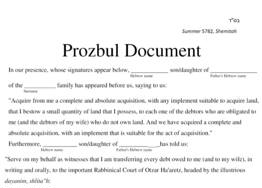Source Sheet: Shemitat Kesafim and Prozbul

See here the Pdf file of this source sheet.
Rabbi Shaul Yisraeli, Shemitah over the generations
עם הסתיים שנת השמיטה מתחיל שוב מהלך העבודה והיצירה של העם כולו במצב אשר לכל אחד כמעט אותם האמצעים. הרי לנו המצווה מבחינת "בין אדם לחברו", מה רב הוא כוח התורה אשר השכילה במצוות אלה, שמיטה ויובל, להושיט בקנה את פתרון בעיית הניגודים בחברה, בין עני ועשיר, אשר כל חכמי הכלכלה מתלבטים בזה ללא מוצא.
With the end of the shemitah year comes the commencement of the process of work and creativity of the entire nation in a state where all have practically identical means. Here we have a mitzvah of Man and His fellow. How great is the Torah's power, as in the great wisdom latent in the mitzvot of shemitah and yovel, to devise a solution to the gaps in society between poor and rich, whereas all of the financial scholars deliberate on this issue without a solution.
Sefer Hachinuch
תעז - עשה: להשמיט את כל ההלוואות בשביעית – "שמוט כל בעל משה ידו"
תפ - לא תעשה: שלא נמנע מלהלוות לעני מפני השמיטה
תעה - לא תעשה: לא לתבוע חוב שעברה עליו שביעית – "לא יגוש את רעהו"
477 Aseh: To remit all loans in the seventh year "all creditors shall remit the due that they claim"
480 Lo Ta'aseh: That one not avoid lending to the poor in light of the shemitah
475 Lo Ta'aseh: Not to demand the repayment of debt (from shemitah) after the seventh year: "Do not dun your fellow."
Gittin 36b
אמר אביי: בשביעית בזמן הזה, ורבי היא, דתניא: רבי אומר: "וזה דבר השמיטה שמוט" – בשתי שמיטות הכתוב מדבר, אחת שמיטת קרקע ואחת שמיטת כספים: בזמן שאתה משמט קרקע – אתה משמט כספים, בזמן שאי אתה משמט קרקע – אי אתה משמט כספים.
Abaye said: [this refers to] The Sabbatical year in the present, in accordance with the opinion of Rabbi Yehuda HaNasi, as it is taught in a baraita that Rabbi Yehuda says: "And this is the matter of the remission: he shall remit." The verse refers to two types of remission, one is the release of land, and one is the remission of monetary debt: [Since the two are equated, one can learn the following:] At a time when you release land [when the Jubilee year is practiced] – you abrogate monetary debts. At a time when you do not release land, you also do not abrogate monetary debts.
Rema CM 67:1
אבל יש אומרים דאין שמטה נוהגת בזמן הזה, ונראה שעליהם סמכו במדינות אלו שאין נוהגין דין שמטה כלל בזמן הזה
But there are those who say that shemitah (=shemitat kesafim) does not apply today, and it seems that these opinions were relied on in countries where the laws of shemitah (=shemitat kesafim) were not observed whatsoever today.
Gittin 36a [Mishnah Shevi'it 10:3]
הלל הזקן, שראה את העם שנמנעו מלהלוות זה את זה ועברו על מה שכתוב בתורה השמר לך פן יהיה דבר עם לבבך בליעל וגו', עמד והתקין פרוסבול; וזה הוא גופו של פרוסבול: מוסרני לכם פלוני דיינין שבמקום פלוני, שכל חוב שיש לי אצל פלוני שאגבנו כל זמן שארצה, והדיינים חותמים למטה או העדים. ומי איכא מידי, דמדאורייתא משמטא שביעית, והתקין הלל דלא משמטא? אמר אביי: בשביעית בזמן הזה, ורבי היא... ותקינו רבנן דתשמט זכר לשביעית.
אמר שמואל: הא פרוסבלא - עולבנא דדייני הוא, אי איישר חיל אבטליניה
This is one of the matters that Hillel the Elder instituted because he saw that the people of the nation were refraining from lending to one another around the time of the Sabbatical Year, as they were concerned that the debtor would not repay the loan, and they violated that which is written in the Torah: “Beware that there be not a base thought in your heart, saying: The seventh year, the year of release, is at hand; and your eye be evil against your needy brother, and you give him nothing” (Devarim 15:9). He arose and instituted the pruzbol so that it would also be possible to collect those debts in order to ensure that people would continue to give loans. And this is the essence of the text of the pruzbol: I transfer to you, so-and-so the judges, who are in such and such a place, so that I will collect any debt that I am owed by so-and-so whenever I wish, as the court now has the right to collect the debts. And the judges or the witnesses sign below, and this is sufficient. The creditor will then be able to collect the debt on behalf of the court, and the court can give it to him.
The Gemara asks about the pruzbol itself: But is there anything like this, where by Torah law the Sabbatical Year cancels the debt but Hillel instituted that it does not cancel the debt? Abaye said: The baraita is referring to the Sabbatical Year in the present, and it is in accordance with the opinion of Rabbi Yehuda HaNasi. … and the Sages instituted it in remembrance of the Sabbatical year. Shmuel said: This pruzbol is an insult of the judges; if my strength increases I will nullify it.
Rabbi Yonatan Eybeschütz, Tumim CM 67:1
ואם כן מאוד ראוי לכל איש להחמיר לעשות על כל פנים זכר למצווה זו בפרוזבול... לבל ישכח זכר מצווה זו (שמיטת כספים- מ.ב.) מקרב ישראל... ואם כן הוא, מצווה זו למה לא נדבק בה בתכלית הדביקות והשמחה.
If so it is proper that every individual act stringently and, in any case, commemorate this mitzvah with a prozbul … so that the remembrance of this mitzvah [shemitat kesafim – MB] will not be forgotten from among Israel … and if so, why should we not cleave to it with the utmost devotion and joy?"
Ben Ish Hai Year 1 Ki Tavo, 26
והנה יש מתחסדים אחר שכותבין הפרוזבול מלווה לחברו סך מה עשרה גרוש או פחות או יותר ועל זה הסך לא יחול הפרוזבול כיון שהלווהו אחר זמן הפרוזבול; ואז אחר ראש השנה כשיביא לו חברו המעות לפרעו יאמר לו: 'משמט אני', ולא יקבלם ממנו. ויאכל הלווה ולחדי (ישמח) במעות אלו והמלווה לחדי במצות שמטת כספים שקיים אותה בפועל. ותהילות לא-ל יתברך הנהגתי מצווה זו פה עירנו בגדאד... אשריהם ישראל אוהבי מצוות השם ועושים אותם בשמחה.
וגם אם לווה אדם מחבירו ככרות לחם, אפילו כיכר אחד – נוהג בזה דין שמיטה.
על כן טוב שתלווה האישה יום ערב ראש השנה כיכר או שתיים או שלוש לחברתה, ואחר ראש השנה כשתפרע לה, תאמר לה "משמטת אני", והרי זו מקיימת מצות שמיטה... וכן עשו קצת נשים פה עירנו יכוננה עליון אמן, כי דרשתי דבר זה בעזרת ה' יתברך ברבים, אשריהם ישראל.
Here there are those who act with piety, and after they write a prozbul they lend a friend a small amount, such as 10 grush, or more or less. For this sum the prozbul will not apply since it was lent after the time the prozbul was written. Then, after Rosh Hashanah when his friend brings him the money to repay him, he will say: "I remit it," and will not receive it from him. The borrower will rejoice with the coins, while the lender will rejoice with the mitzvah of shemitat kesafim that he actually performed. And praised be the L-rd, Blessed be He, that I instituted this mitzvah here in our city of Bagdad … happy are Israel, who love the mitzvot of G-d and perform them joyfully.
And even if one lends his friend loaves of bread, even one loaf – the laws of shemitah apply to it. Therefore, it is good if erev Rosh Hashanah, if a woman lends a loaf or two or three to her friend, and after Rosh Hashanah, when she comes to repay her, the former will tell her, "I remit it." In this way she will perform the mitzvah of shemitat kesafim … and this is what some of the women do in our city, which the Heavens should establish, amen, after I lectured on the word of G-d, Blessed be He, in public. Happy are Israel.
Yisah Yosef CM 27, Rabbi Yosef Efrati, quoting Rabbi Elyashiv (Elul 5775)
להלוות בחודש אלול כסף ל... ויקבע מועד הפרעון לפני ר"ה. בפרוזבול יכתב בזה הלשון – "ואמר לנא וכו'. שכל חוב שיש לי חוץ מהחוב המסוים (שחב לי הגר"ע) שאגבנו כל זמן שארצה". ובזה מקוים מעשה המצוה, ונזכה במהרה בעזה"י לקיים יובל ושמיטה מדאורייתא.
To lend in the month of Elul money to … and determine a time for repayment before Rosh Hashanah. In the prozbul it should state as follows: "All debts owed to me expect for a specific debt (owed me by,,,), I will collect at any time I please." And in this way he performs the mitzvah. We should merit to perform yovel and shemitah from the Torah speedily, with G-d's help.




